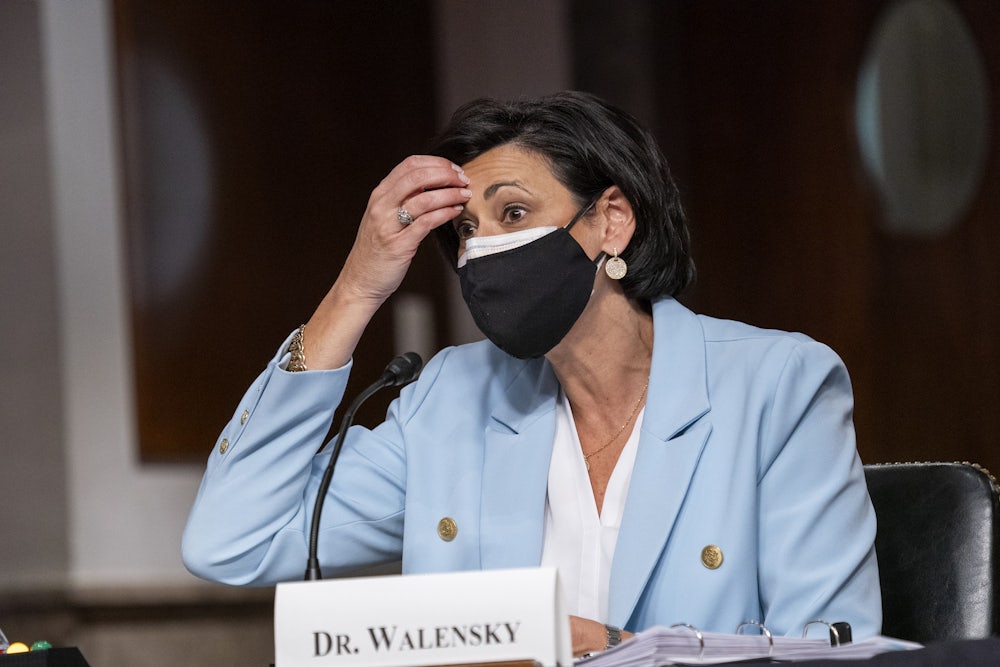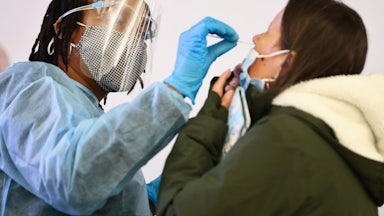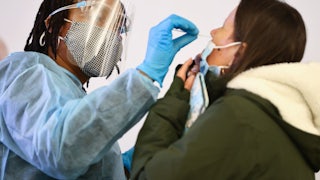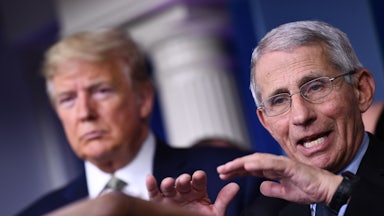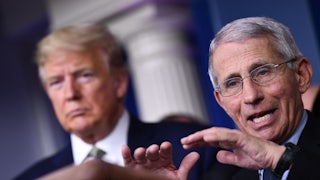On Tuesday, Rochelle Walensky, the director of the Centers for Disease Control and Prevention, wore two masks as she testified before the Senate on the government’s response to emerging variants of Covid-19. Seated next to her was Anthony Fauci, the country’s top infectious disease expert and the face many Americans associate with sound pandemic policy, without any mask at all. It was a relatively small divergence but a potent one, considering that the CDC is under fire for confusing messaging at a time when over 142,388 Americans are hospitalized with Covid-19 nationwide. Almost a year into Walensky’s tenure, and following “months” of media training, the physician and scientist is still struggling to provide unambiguous guidance. Case in point: The agency is reportedly considering recommending people wear N95 or KN95 masks, rather than cloth ones, for better protection against the highly contagious omicron variant. Outside experts have been recommending this measure for some time. Yet the expected CDC guidance stresses the importance of N95 masks only if a person can “tolerate wearing” one all day.
Walensky’s supporters say this sort of nuance and pragmatism is a virtue. They have described her as a doctor and scientist who thinks about society-level problems as she would an individual diagnosis, considering recommendations that are contingent on any number of variables. In a moment when vaccinations are widely available though far from universally adopted, there are a lot of variables to consider and communicate well. In the Senate, Walensky fielded questions about controversial recommendations for shortened isolation periods, clarifying the procedures for infected or exposed individuals at length. But for all the pains this administration has taken to distance itself from the unscientific and “politicized” Covid-19 policies favored by the Trump administration, the position of CDC director is undeniably a political one, as the backlash to a number of Walensky’s ungraceful statements have shown.
Though Walensky’s troubles in the agency predate omicron, it was those isolation guidelines in late December that renewed attention to her lack of experience in government: While she and Fauci both indicated the guidelines were a sound attempt to maintain “social function,” Fauci publicly suggested testing recommendations that never materialized would soon follow, and unnamed sources claimed Walensky didn’t seek much input before posting what would become the CDC’s official line. The guidance inspired a rare and sharp critique from the American Medical Association, which said that “potentially hundreds of thousands of people could return to work infectious if they follow the CDC’s new guidance,” particularly as the measures didn’t include a negative Covid-19 test result. The controversy was fueled by a sense that the agency was being less than honest about how it came to its determination. While Walensky disputes this, nearly every public health expert, including her supporters, believe the recommendations had less to do with best practices than the fact that it’s nearly impossible in many parts of the United States even to find a test.
The incident was so damaging that a spate of stories appeared recently about the media coaching Walensky is receiving from the high-powered Democratic political consultant Mandy Grunwald. But apparently that coaching wasn’t enough. On Friday, the CDC director appeared on Good Morning America and botched an explanation of a recent study showing the effectiveness of vaccines. An edited clip of the director saying, “The overwhelming number of deaths, over 75 percent, occurred in people who had at least four comorbidities,” and that those deaths were mostly “people who are unwell to begin with” was shared widely on both the left and the right. For political factions who believe the virus is a fiction perpetuated by an overbearing government, the clip represented an “admission” that Covid-19 was no big deal. For people convinced the administration has given up on its citizens, it seemed like evidence the government was ready to let anyone with a comorbidity die.
There were early indications that Walensky would struggle with a role that is frankly as much about communication and consistency as knowing the science. In February 2021, during a press briefing, Walensky indicated twice that teachers didn’t need to be vaccinated in order for schools to reopen, a statement quickly picked up and endorsed by a smattering of officials who were eager to reopen their states. But then, during a subsequent press conference, the White House claimed the CDC director had only been speaking in her “personal capacity,” a distinction that didn’t bode well for an agency that was simultaneously defining itself in opposition to the CDC under Trump. A few months later, Walensky said vaccinated populations didn’t need to wear masks in public, a position she reversed two months later. And an increasing number of reports over the last month suggest the CDC chief has either alienated or dismissed advisers as she makes recommendations some call hasty or half-baked.
The CDC isn’t the only agency offering muddled guidance on Covid-19 protocols. Take the Department of Health and Human Services, which is offering an absurd testing apparatus that “strongly incentivizes” private insurers to reimburse Americans for tests through a web of “preferred providers”—a grim example of how complicated commonsense measures can be made. But Walensky’s actions raise uncomfortable questions about how she’s making her recommendations. The new isolation guidelines, she said in December, were “what we thought people would be able to tolerate”; her ruling against her advisory board to promote booster shots widely earlier than expected suggested an allegiance to the White House’s line. The lack of testing requirements after isolation is a reflection of how much of the CDC’s guidance is circumstantial rather than ironclad. When Walensky took over from Dr. Robert Redfield, the agency’s chief under Trump, she drew a hard line between herself and her predecessor: “I would say that the people of the CDC … have been muzzled,” she said, and “the science has not always been followed.” But science can be politicized in myriad and subtle ways. Right now, the Biden administration is opting for an interpretation of the science that will interfere with the economy to a minimal degree. It’s not extreme denialism like his predecessor’s, but it’s political all the same.
